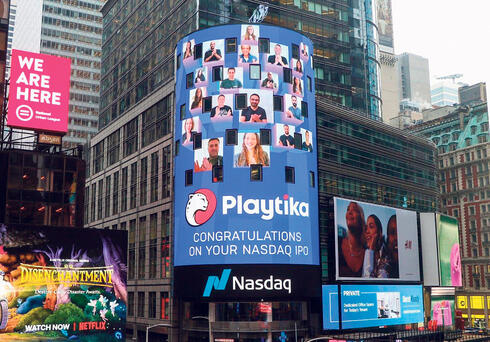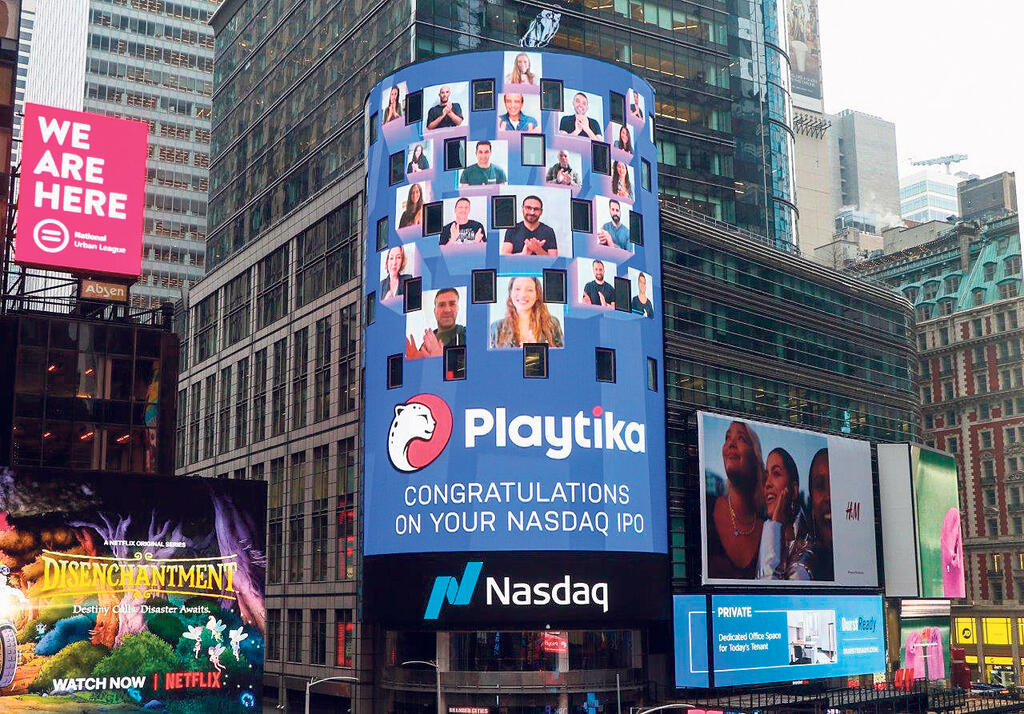
Game over? Playtika layoffs are just tip of the iceberg for gaming giant
The company is embarking on a second round of layoffs in six months after the cancellation of the deal in which Joffre Capital was supposed to purchase 25.5% of its shares. Playtika insists there is no connection between the two
UPDATE 12.12: Playtika confirms lay off of 610 employees, 15% of team
What is exactly going on at Playtika? A second round of layoffs in six months, held in embarrassing proximity to a flamboyant party that took place last Thursday at the Tel Aviv port, is only a hint of trouble at the Israeli gaming company. From reports submitted by the company to the U.S. Securities and Exchange Commission last week, it appears that squabbles and disagreements between the company and Joffre Capital already began in July after it was announced that the latter will purchase a 25.5% (106 million shares) share in Playtika. Now the deal has finally exploded, and James Lu, who joined Playtika's board of directors in the summer, has resigned from it in harsh tones accompanied by a sharp and unusual letter.
Beyond that, Joffre demands that Playtika's largest stockholder PHUKII return the advance of $50 million already paid as part of the deal, which probably served as a catalyst for the latest layoffs of approximately 500 of the company's employees, of which 180 are based in Israel. This is a second round of layoffs following the parting with 250 workers last May. The previous round did not affect Israel, while this time the activity of games will be stopped and entire teams will be sent home, including developers. In total, Playtika will announce this week the layoffs of about 12-15% of the workforce, which currently numbers 4,100 employees, of which 1,000 are in the company's offices in Herzliya.
Playtika insists that there is no connection between the layoffs and the collapse of the deal with Joffre Capital and the demand for the reimbursement of $50 million. Sources around the company also say that it has not yet agreed to return the money, and even if it did, it is a rich company with cash balances of $600 million and a positive flow from operations. In October, Playtika used $600 million to buy back its own shares. If so, then why fire employees, especially when there is money for last week's party with the participation of Israeli pop star Noa Kirel, Ran Danker and other celebrities? People around the company say that after the swelling of the gaming market during the pandemic period, the order of the day is to become more efficient and trim the fat.
As part of the deal, Joffre was supposed to pay $1 billion based on a value of $8.5 billion. In the meantime, however, Playtika shares have fallen by nearly 40% to a value of $3 billion. In the letter Lu sent to Playtika's board of directors, he accused the company of failed corporate governance and of the board members being puppets of Robert Antokol, the company's founder, chairman and CEO.
"Despite my immediate efforts to work with the Board to address the Company's deficient corporate governance practices, which were outlined in a letter I delivered to the Board on July 16, the Board has failed to act in a sufficiently meaningful manner," he wrote in the letter of resignation that he submitted to Playtika's board of directors on November 30 and which the company reported only a week later. "I mainly raised the discomfort with the fact that the management actually controls the directors, which led to several incidents of conflict of interest and the potential for enriching the managers at the expense of the investing public. Thus, for example, the employee retention plan adopted by the company is entirely up to the interpretation of the CEO who also serves as the chairman of the board and is also the main beneficiary of the program," added Lu, who previously served as a senior executive at the Chinese internet giant Baidu and also serves as the chairman of the dating app Grindr.
Regarding the cancellation of the deal with Joffre , Playtika provided the following response: "After less than five months as a member of the board of directors, Mr. Lu resigned on November 30. As CEO and the sole executive member of the company on Playtika's board of directors, Robert's goal continues to be the direction and continued prosperity of the company as it has been since he founded Playtika more than a decade ago."
In reference to the demands for the return of the initial payment by Joffre and Lu's accusations, Playtika said: "Back in August, the board of directors discussed the concerns he raised about the performance and additional meetings were scheduled, among other things, to approve the appointment of a leading independent director."
Who is right? The truth is probably somewhere in the middle. Playtika was issued at a valuation of $11 billion in January 2021, about a decade after it was founded by Antokol and Uri Shahak, who retired from the company a long time ago. Even before the IPO, Playtika changed hands twice, once when it was acquired by the gambling group Caesars Entertainment and again in 2016 when it was bought for $4.4 billion by Chinese investor group headed by Yuzhu Shi.
Over the years, Playtika's board of directors approved generous benefits for Antokol and other managers, including a private plane and personal security services. The retention plan to which he refers promises Antokol an extraordinary compensation worth $400 million in the event of the change of control of Playtika, which is double the already high compensation he is set to receive in the case of dismissal without reason or resignation for a reasonable reason. The high compensation is due to the acceleration of options and blocked shares in the events listed. In 2020, Antokol received a generous package of options worth $310 million. For his work in 2021 he received a compensation of $63 million which included a special bonus of $16.5 million following the successful IPO on Wall Street.
Playtika's IPO was indeed successful, but the fall of the shares and the change in the gaming market, which is now also facing the possible cancellation of the giant $69 billion merger between Microsoft and Activision, led to a sharp drop in value. This fall may be the cause of the "buyer's remorse" which Joffre began feeling as it saw how the gap between the value in the transaction and the actual value widened, while Playtika's performance actually weakened after the high tide during the pandemic period.
The gaming industry was one of the beneficiaries of the lockdowns that kept the world at home and made more people play mobile and online games developed by Playtika. In the last quarter, the company slightly missed the profit forecast and the net profit amounted to $68 million compared to $80 million in the corresponding quarter. Revenues have almost stagnated at a level of $647.8 million for several quarters now, even though it purchased Finnish company Redecor for $600 million about a year ago to revive growth. With the release of the latest report, Playtika reduced its annual revenue forecast, which now stands at $2.6 billion in revenue and $900 million in adjusted earnings before impairments.















